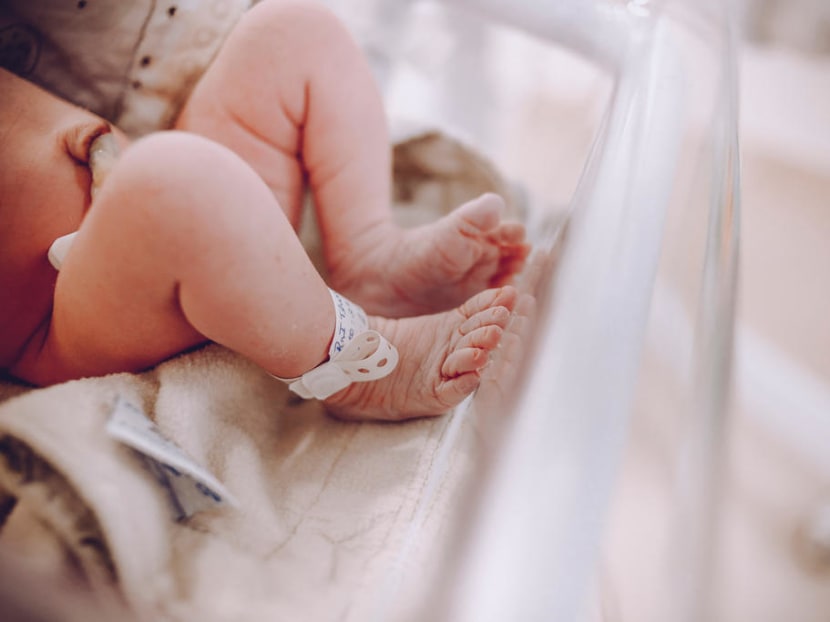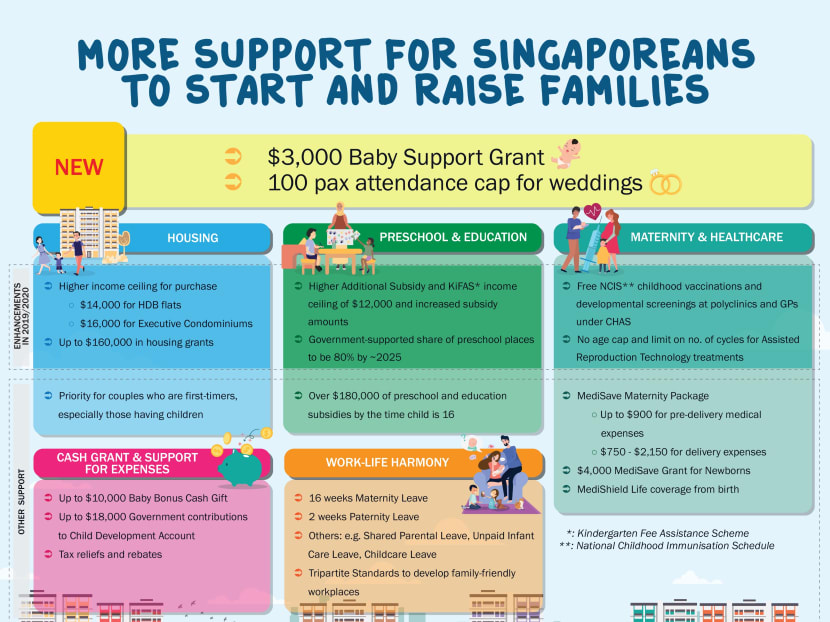Covid-19: Govt announces one-off S$3,000 Baby Support Grant to help couples
SINGAPORE — Families welcoming a new baby from Oct 1 this year to Sept 30, 2022 will receive a one-off Baby Support Grant of S$3,000, Minister in the Prime Minister’s Office Indranee Rajah announced on Friday (Oct 9).

With the S$3,000 Baby Support Grant, the Government is hoping to encourage couples not to delay their plans to get married and start a family.
- Government to give one-off S$3,000 Baby Support Grant for families having children from Oct 1, 2020 to Sept 30, 2022
- The move aims to ease the financial burden of young couples affected by the Covid-19 pandemic
- The grant is in addition to up to S$10,000 in benefits now available to eligible parents welcoming a new baby
- Expectant mothers are happy but parents who missed out on qualifying for the grant were disappointed
SINGAPORE — Families welcoming a new baby from Oct 1 this year to Sept 30, 2022 will receive a one-off Baby Support Grant of S$3,000, Ms Indranee Rajah announced on Friday (Oct 9).
The Minister in the Prime Minister’s Office who looks after population matters said that the move, which supplements the existing Baby Bonus cash gift, aims to ease financial concerns that couples may have about having children during the Covid-19 pandemic and recession.
Eligible parents now receive up to S$10,000 in benefits through the Baby Bonus cash gift, which is given out in five instalments over 18 months following a child's birth, along with other support.
Speaking to reporters after a visit to the Mothercare baby product store at the Harbourfront Centre, Ms Indranee said that this year has been “especially challenging” for young couples.
“The Covid-19 pandemic has affected lives and livelihoods and some Singaporeans are delaying their marriage and parenthood plans as a result of insecurity about jobs and incomes.”
She noted that a recent survey commissioned by the National Population and Talent Division and the Ministry of Social and Family Development found that about three in 10 respondents are likely to delay their plans to get married or have a child as a direct result of the pandemic.
With the Baby Support Grant, parents will now receive up to S$21,000 in cash, or cash-like benefits for the birth of their first child, and up to S$35,000 for the fifth child and beyond after accounting for other forms of government support, Ms Indranee said.
This is in addition to parental leave, subsidised preschool, and healthcare, she added.
For instance, families now receive S$8,000 in Baby Bonus cash gift for their first-born, S$6,000 in government contributions to the Child Development Account (a special savings account under the Baby Bonus Scheme), and S$4,000 in the Central Provident Fund's MediSave grant for newborns. With the latest Baby Support Grant, the total amount of government support adds up to S$21,000.
Likewise for their fifth and subsequent children, families receive S$10,000 in Baby Bonus cash gift, S$18,000 in contributions to the Child Development Account and S$4,000 in MediSave grant. With the Baby Support Grant, the total comes up to S$35,000.
“The existing marriage and parenthood package is comprehensive and we hope that with this additional Baby Support Grant, it will give a further boost to encourage couples not to delay their plans to get married and start a family,” Ms Indranee said.
The one-off grant will be deposited into the same bank account nominated by parents when they enrol their child for the Baby Bonus Scheme and its cash gift.
Parents will receive the Baby Support Grant from April next year, or within one month of enrolment.
Ms Indranee said that the S$3,000 was a “helpful” amount when accounting for other assistance that the Government has disbursed since the Covid-19 pandemic hit.
When asked why the specific eligibility dates were chosen for the grant, she said: “No matter which date, there will always be a question of whether could it be earlier or later, could it be sometime further down the road… We knew that couples were having concerns about proceeding with their marriage and parenthood plans so we decided we have to do something.
“We settled the policy very recently and felt we should announce it in October.”
The Government felt that two years was “a reasonable period” to disburse the grant but will review the scheme at the end of two years to see if it is still relevant and useful, she added.
There are no numbers yet to establish if there has been a significant drop in Singapore’s total fertility rate (TFR) this year, but it remains a concern for the Government given indications that couples are planning to defer their marriage and parenthood plans, she said.
Singapore’s TRF was 1.14 in 2019, well below the rate of 2.1 required for the population to replace itself.
If the rate dips further due to Covid-19, this means that the number of Singaporean children will drop even further, which will affect the nation’s population numbers, Ms Indranee said.
“So, we hope that this support will be useful to families and encourage them to carry on with their marriage and parenthood plans.”

JOY FOR SOME PARENTS, DISAPPOINTMENT FOR OTHERS
For parents who have already qualified, the news is welcome during a period when they have had to tighten their belts due to the pandemic.
Ms Kelly Wong, 29, who is expecting her first child in December, called the grant “a generous amount”.
The freelance pilates instructor said that her income had dropped by up to 40 per cent during the circuit breaker as compared to the period before, because she had to cancel many of her lessons and shift some online. Non-essential activites were halted and people had to stay home during the circuit breaker in April and May.
“Just having a child is going to result in a huge increase in our regular expenses, so any kind of help would be useful,” Ms Wong said.
Similarly, Ms Merdin Yeoh, a 32-year-old yoga instructor, said that the grant was “a good surprise” and will be useful for daily expenses when she delivers her first child next January.
However, parents who missed out on qualifying for the grant because they had their children before Oct 1 were left upset and disappointed.
Just hours after the grant was announced, for instance, a petition on the change.org website was making the rounds on social media calling for the grant to be extended to all parents who have had children this year.
As of 10pm on Friday, close to 2,400 people had signed the petition.
Mrs Rachel Ho, a 30-year-old communications manager who had her first child in August, said that it was frustrating to miss out on qualifying for the grant as she had to bear higher expenses for her child as a direct result of the Covid-19 crisis.
For instance, she had to forfeit her S$300 deposit for a confinement nanny from Malaysia due to border controls that have been in place since March.
She was also told by a confinement agency to fork out S$4,000 for a confinement nanny, more than the usual market rate of S$3,200 to S$3,500, due to a lack of nannies available in Singapore.
“We have been directly hit by increased costs. Why not give the money directly to people like us?” Mrs Ho questioned.











